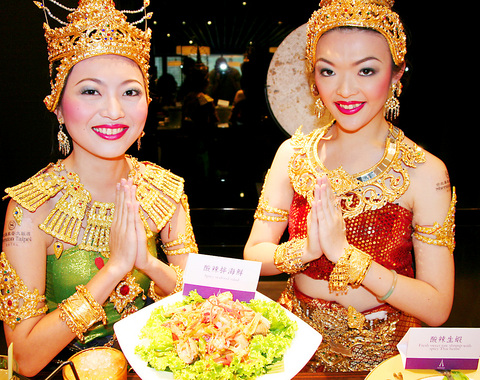Chef James Lin (林作煜) was taking a stroll around Bangkok when he came across the floating markets and noticed locals were addicted to a zesty appetizer that involved wrapping a variety of spices in banana leaves.
“I was really searching for food that nobody else in Taiwan was serving up,” said the Sheraton Taipei's chief executive chef, who has been honing his culinary skills in the US and oversaw the menu at the hotel's newly opened Sukhothai restaurant.
The spices — shallots, dried shrimps, coconut, chili, lime, young ginger, green mango, roasted peanuts and a sugar cane-based mieng sauce — are folded in a leaf and eaten raw. One can change the amount and combination of spices to personalize the dish, but either way it's a taste sensation.

PHOTO: JULES QUARTLY, TAIPEI TIMES
Though Lin has substituted spinach for banana leaves in what he calls the South Sea salad roll, the other 58 dishes presented at Sukhothai mostle rely on imported ingredients from Thailand.
This means that traditional Thai dishes, which are often augmented in local restaurants so they taste like Chinese food, get a fresh lease on life. The original flavors of classics such as tom yum gung (sweet and sour shrimp soup) renew one's faith in the power of food to surprise and delight.
Joining Lin in providing authentic tastes is chef Phonlaphat Sudsaidee, from northeast Thailand, who has combined tradition and creativity to produce food rarely encountered here.
We were served what is called the khantoke sampler platter, consisting of nine small dishes, all of which have a unique flavor but nevertheless complemented each other. The som tam (green papaya and shrimp salad) came with a tart lime dressing and was eaten with rice that was pressed in the hand, traditional Thai style.
The meal came to a conclusion with Thai sweet rice and mango, and flour pastry with water chestnuts and sweet coconut cream. Sukhothai, by the way, means “golden dawn” and was the Kingdom of Siam's first capital in the 13th century.
Until Aug. 31 guests are offered a free appetizer of kratong thong (minced chicken tartlets) and ice fruit tea. Also, go to www.sheraton-taipei.com and download a coupon for one free dessert.
Thai food doesn't get much better than this, even in Thailand. And now is the time to visit.

On April 26, The Lancet published a letter from two doctors at Taichung-based China Medical University Hospital (CMUH) warning that “Taiwan’s Health Care System is on the Brink of Collapse.” The authors said that “Years of policy inaction and mismanagement of resources have led to the National Health Insurance system operating under unsustainable conditions.” The pushback was immediate. Errors in the paper were quickly identified and publicized, to discredit the authors (the hospital apologized). CNA reported that CMUH said the letter described Taiwan in 2021 as having 62 nurses per 10,000 people, when the correct number was 78 nurses per 10,000

As we live longer, our risk of cognitive impairment is increasing. How can we delay the onset of symptoms? Do we have to give up every indulgence or can small changes make a difference? We asked neurologists for tips on how to keep our brains healthy for life. TAKE CARE OF YOUR HEALTH “All of the sensible things that apply to bodily health apply to brain health,” says Suzanne O’Sullivan, a consultant in neurology at the National Hospital for Neurology and Neurosurgery in London, and the author of The Age of Diagnosis. “When you’re 20, you can get away with absolute

May 5 to May 11 What started out as friction between Taiwanese students at Taichung First High School and a Japanese head cook escalated dramatically over the first two weeks of May 1927. It began on April 30 when the cook’s wife knew that lotus starch used in that night’s dinner had rat feces in it, but failed to inform staff until the meal was already prepared. The students believed that her silence was intentional, and filed a complaint. The school’s Japanese administrators sided with the cook’s family, dismissing the students as troublemakers and clamping down on their freedoms — with

As Donald Trump’s executive order in March led to the shuttering of Voice of America (VOA) — the global broadcaster whose roots date back to the fight against Nazi propaganda — he quickly attracted support from figures not used to aligning themselves with any US administration. Trump had ordered the US Agency for Global Media, the federal agency that funds VOA and other groups promoting independent journalism overseas, to be “eliminated to the maximum extent consistent with applicable law.” The decision suddenly halted programming in 49 languages to more than 425 million people. In Moscow, Margarita Simonyan, the hardline editor-in-chief of the